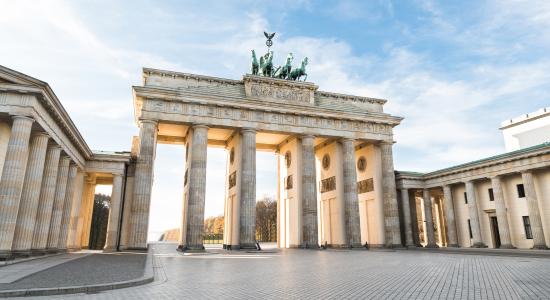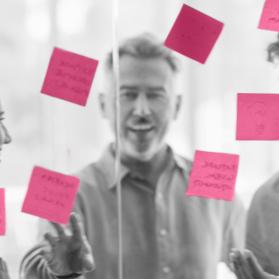New business models can be generated based on blockchain or distributed ledger technologies. Helge Königs and his finance team built up the corresponding know-how - and advanced from business partner to key player in the realization of digital business models. With the Truck Wallet, they turned the vehicle into an economic agent that takes over activities that were previously the responsibility of the driver or logistics provider.
How did you get involved with blockchain and how has blockchain influenced your finance organization?
In 2016, as part of the Best Finance change process, we looked at emerging technology trends - blockchain or distributed ledger technologies (DLT) were among them. Originally, our ambition was to understand the benefits and opportunities of technologies in such a way that we could discuss them with our business partners at eye level and assess corresponding projects. Since we organized the learning through concrete projects, various finance departments started their own initiatives on this topic. For example, the treasury department looked at ways to make corporate finance more efficient and direct. We ourselves built and programmed a use case in which the truck can read decentralized the extent to which the customer is servicing his financing within the framework of a lease - with the consequence that he automatically limits his driving activity if he is not servicing.
Beyond the hype surrounding this technology, the finance organization has positioned itself internally as a pioneer, innovator and know-how carrier with regard to DLT. Building up this know-how has made us competent contacts who can assess the possibilities and limits of using DLTs in other areas of the company as well.
What is your personal assessment of the significance of blockchain for the CFO sector and how will blockchain still influence the CFO's work in the future?
That depends on the self-image and perspective of finance and controlling in the company. DLTs in the current spectrum do not change classic activities such as controlling and accounting. This focus, in turn, would be an indictment of this area. As a design partner for the business partners and in terms of the further development of their own organization and the company's business model, DLTs will have an extraordinary significance for the finance area.
What specific applications of Blockchain can you imagine in Finance & Controlling? Do you plan to introduce other digital finance products, processes, and applications?
In the classical Finance & Controlling organization, in my view, it is especially new forms of corporate financing that have already been tested in various constellations. In a broader sense - and by this, I mean the active role of the Finance & Controlling organization within the framework of the further development of the company and its business model - it is all forms of automation of payment flows that flow from one's own company to others, as well as all extensions of one's own products in which automated payments or payment options contribute to product differentiation. In this respect, the role of finance is changing, and the classic function of business partner is becoming an essential player in the realization of digital business models.
Our Interview Partner
Helge Königs has held various positions at Daimler Truck AG and its predecessor organizations for more than 20 years, primarily in finance. Among other things, Königs has worked as CFO for subsidiaries in China, Germany, and France. He was a manager in the change process of the finance and controlling organization of Daimler Truck AG - Best Finance, in the context of which he initiated the "Truck Wallet" project.
What exactly is the Truck Wallet and what technology is behind it?
The concept of the Truck Wallet emerged from our first use case, in which the vehicle could check its own payment status in a decentralized way on a blockchain and correspondingly programmed reactions resulted, such as reducing or stopping the power. We were aware that the model was very simplified. But the technology served its purpose.
In the elaboration and programming of the functionality in the vehicle, we worked with DLTs - in this case with Ethereum. In the analysis, however, it was more important to realize that any starting point for the vehicle's ability to initiate transactions is the ability to authenticate itself unambiguously and tamper-proof. Depending on the use case, it is then necessary to decide to what extent the most useful technology is a DLT. However, the core remains the approach that the truck has the ability to identify itself uniquely and forgery-proof.
What goal did you pursue with this at Daimler Trucks?
The goal of the Truck Wallet is for the vehicle to initiate and complete transactions on its own, including payment for those transactions, based on the ability to uniquely identify itself. This capability enables our customers' service providers to create new digital offers that optimize the logistics chain. The vehicle becomes an actor, or, as we say, an economic agent, and takes over activities that today lie with the driver or logistics provider. The ability to pay automates separate processes today.
Has the project been costed with a business case and if so, do you believe in the economic viability and benefits?
All our projects are based on positive business cases. In finance, it was important for us to learn how business cases of digital business models are calculated and which KPIs are used for this. This was a new world for us, and we first had to learn the rules of the game. In this respect, I not only believe in the benefits, but am also convinced of the economic efficiency due to the constantly evolving business cases. Without this mathematical added value, there would be no funding for the project.
Is the project already in series production and with the customer?
No, but on the way there. After the proof of concept and the first implementation of a minimum viable product, we have created the conditions required for series production, both on the vehicle side and in terms of the necessary IT infrastructure. We are currently in the process of testing the application with selected customers together with the first business partner. The tests with our own vehicles have already been running for several months and are very promising. The first application will be a milestone for us, but at the same time the truck wallet platform needs more applications quickly so that we can get the necessary traction on the topic. That looks promising.
We wish you much success!








